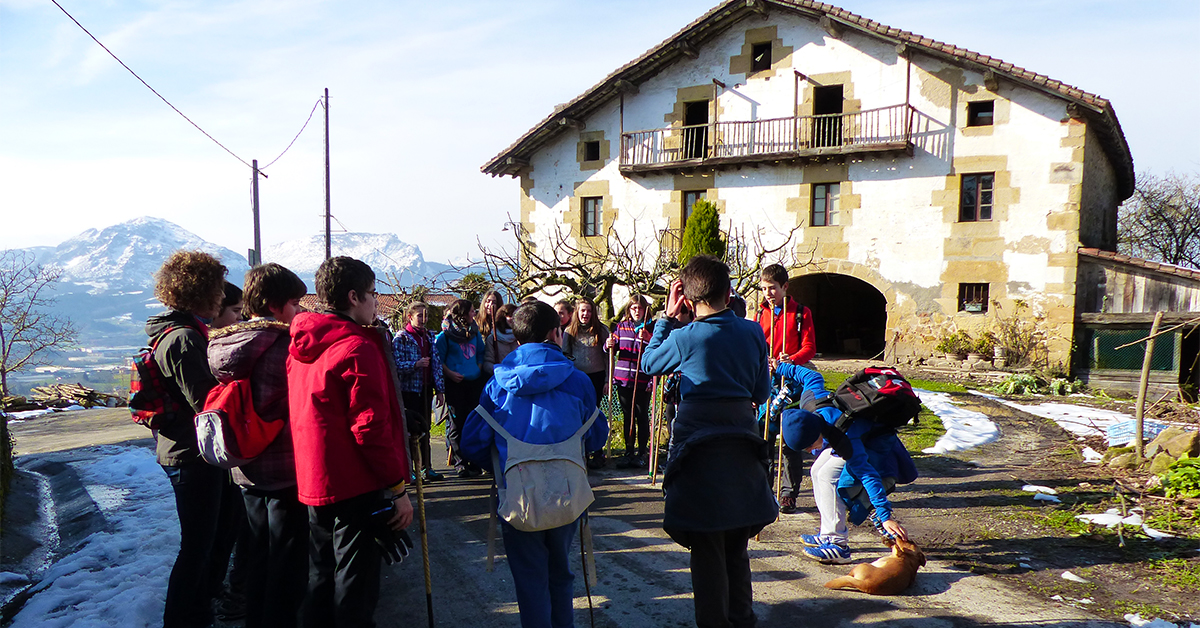Basque ethnography at a glance
Eguen Zuri —literally, ‘Festive Thursday’— refers to the Thursday before Shrove Sunday, in other words, the Thursday after the so-called Basaratoste. These two celebrations mark the beginning of the carnival cycle in Bizkaia.
The mentioned ritual outing to the woods known as Basaratoste [See a previous post titled Txitxiburruntzi, Sasikoipetsu, Basaratuste, Kanporamartxo. Gearing up for carnival], among other denominations, would be widely welcomed across large areas of Bizkaia. The feast of Eguen Zuri, is limited to the surroundings of Durango, Mount Oiz and Arrankudiaga. According to Resurrección M.ª de Azkue, north of Mount Oiz the observance vanished by the beginning of the 20th century. In and around Durango, however, it experienced different realities: some localities have maintained it without interruption until the present day, a handful of them lost it forever, and others recovered it with restored fervour in the 1980s after some years of oblivion.
The very name Eguen Zuri gives us some clues about this popular festivity. Eguen is the name of the fourth day of the week, that is, ‘Thursday’, in the Bizkaian dialect. And the adjective zuri indicates that in spite of it being a Thursday, it was a feast day, a ‘day off work’, a ‘day off school’. So, children and young boys and girls looked forward to the occasion with lively anticipation.
In Spanish it is called Jueves Gordo ‘Fat Thursday’ or Jueves de Lardero ‘Greasy Thursday’, hence the well-known saying: Jueves gordo, viernes delgado, sábado regular y domingo carnaval ‘Fat Thursday, skinny Friday, regular Saturday and carnival Sunday’.
Asking for alms was traditional both on this day and on others within the carnival cycle. On Fat Thursday, more specifically, schoolchildren (only boys in the very old days) would sing verses neighbourhood to neighbourhood and house to house in exchange for food —chorizos, eggs, walnuts, hazelnuts…— or a few coins.
Carnival is celebrated in the middle of winter. Farm lofts and pantries are full to their capacity at this time of year. The fruits of the harvest and the highly-appreciated products obtained from pig slaughters have already been safely preserved, ready to be consumed. It is therefore the best of times to fulfil the ancient tradition of helping the needful. Folks who are in need have traditionally been licenced to ask for sustenance; and those who have the means must give.
The verses which are sung both at carnival and at other celebrations throughout the year follow a fairly similar structure: greetings, request for permission to sing (if the household is in mourning, a prayer is said instead), particular references to the day, praises to the members of the family, petition, and thanksgiving; and should they not receive what they request, firm denunciation of the lack of solidarity.
This is the version we gathered from Juanita Bastida, native of Berriz, in 2010:
1
Eguen Zuriko eguna
Jaungoikoak berak egina
eskola-mutilak ibiltzeko
limosna on baten bila.
(Fat Thursday / created by God himself, / for school lads to go round / asking for substantial contributions.)
2
Hor goian-goian goldea
haren gainean belea,
etxe honetako na(g)usi jauna
nekazari langilea.
(Up there is the plough / the raven flies over it, / the man of this house / is a hard-working peasant.)
3
Poltsan baditut erreal bi,
bata bestearen irudi,
etxe honetako etxekoandreak
Ama Birjina dirudi.
(I have two reals in my pocket / one like the other, / the woman of this house / is the living image of the Virgin Mary.)
4
San Kasiano obispua,
eskola-maisu jakituna,
Jesukristoren fedeagaitik
odola emon ebana.
(St Cassian the bishop / wise school teacher, / for Jesus Christ’s faith / he gave his life.)
5
Santu hau bitartez dala
ez eizu izan okerrik,
orain bagoaz danok aurrera
agur danori eginik.
(In the name of this saint / no wrong will come to you, / now we are going ahead / so goodbye to you all.)
6
Emon behar b(ad)ozu, emoizu
bestela ezetz esaizu,
ate ondoko haizeak hartzen
amak ez gaitu bialdu.
(If you wish to give, do give / otherwise say you will not, / to feel the cold at your door / our mother did not send us.)
7
Mari Mondrongo, Mondrongo
hik ez don asko emongo,
hik emongo (do)nan limosneagaitik
ez jonagu asko edango.
(Mari Mondrongo, Mondrongo / you will not give us much, / with the alms you give us / we shall not drink much.)
Children would sometimes carry a rooster in a basket for their rounds. They might even dedicate several lines to the bird, as they expressly do in Arrankudiaga:
Oilar gorria (e)ta bai ederra
(e)ta gure palu(a) daukagu,
honentzat bere eskatzen dogu
zer edo zer ahal badozu.
(With a handsome red rooster / and our walking stick in hand, / we ask alms for us and for it / if you care to give us some.)

Game of the rooster. Ermua (Bizkaia), 2012. Igone Etxebarria. Labayru Fundazioa Photographic Archive.
Finally, a brief mention of the game of the rooster, a deep-rooted tradition in the coastal town of Ermua, observed without interruption for decades, even during the hard post-war years, when there were great shortages and needs. Considering that the prize would be the cock itself, this game was celebrated with great enthusiasm.
Nowadays it is organized jointly by council and local schools. The game is played in the square in much the same way as in the past. With a single exception: the bird in the cage is not a real cock. Blindfolded with a handkerchief, participants need to find it, accompanied by txistu players and helped by spectators who try to guide them with their shouts. The prize is now a trophy in the shape of a rooster.
Akaitze Kamiruaga – Cultural Popular Heritage Department – Labayru Fundazioa
Translated by Jaione Bilbao – Ethnography Department – Labayru Fundazioa
Reference for further information: Adolfo Arejita, Igone Etxebarria, Akaitze Kamiruaga. Aratusteak Bizkaian [Carnival in Bizkaia]. Geureak collection. Bilbao, 2013.


